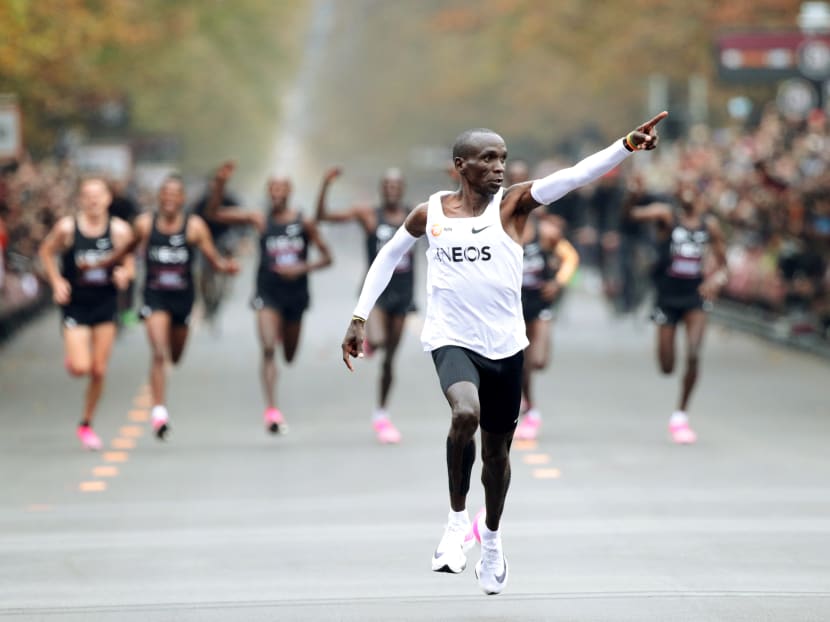'Last barrier of modern athletics' broken: Kenyan Olympic champ makes history by running marathon in under 2 hours
VIENNA — Kenyan Eliud Kipchoge made athletics history on Saturday (Oct 12) when he became the first person to run a marathon in under two hours, although his remarkable effort will not be recognised by the sport's governing body.

Kenya's Eliud Kipchoge, the marathon world record holder, crosses the finish line during his attempt to run a marathon in under two hours in Vienna, Austria, Oct 12, 2019.
VIENNA — Kenyan Eliud Kipchoge made athletics history on Saturday (Oct 12) when he became the first person to run a marathon in under two hours, although his remarkable effort will not be recognised by the sport's governing body.
The Olympic marathon champion and world record holder completed a course around Vienna's Prater Park in one hour 59 minutes and 40 seconds (1:59:40) on a cool, misty and windless autumnal morning.
In becoming the first person to cover the marathon distance in less than two hours, Kipchoge, 34, broke through a temporal barrier that many would have deemed untouchable only a few years ago and achieved a sports milestone granted almost mythical status in the running world.
Still, the eye-popping time will not be officially recognised as a world record by the International Association of Athletics Federations because it was not run under open marathon conditions.
Guided by rotating seven-man teams of pacesetters, many of themselves renowned athletes, and an electric pacecar that shone green lasers onto the track, Kipchoge averaged around 2 min 50 sec per kilometre for 42.2km.
He reached the halfway mark in 59 min 35 sec, 11 seconds inside the target, and ran remarkably consistently with his one-kilometre times fluctuating between 2 min 48 sec and 2 min 52 sec.
For the last kilometre, the pacemakers and car peeled away and Kipchoge pointed to the crowd and smiled as he completed the run.
Kipchoge said it was the biggest athletics milestone since Roger Bannister broke the four-minute mile barrier in 1954.
"I am feeling good, after Roger Bannister it took another 65 years to make history," he said. "Now I've gone under two hours to inspire other people and show the world that nobody is limited."
"I can say I'm tired. It was a hard run. Remember, the pacemakers are among the best athletes in the world, I appreciate them for doing the job."
"It means a lot for Kenya," he added.
The run, organised by British petrochemical company INEOS and dubbed the INEOS 1.59 challenge, featured a cycle of hype and commercial buildup more reminiscent of a heavyweight prizefight than a road race.
Organisers billed the two-hour mark as “the last barrier of modern athletics” and tried to get a hashtag, #nohumanislimited, trending on social media.
Kipchoge, the winner of eight major marathons and three Olympic medals, repeatedly compared a potential sub-two-hour marathon to humanity’s first journey onto the surface of the moon.
Whatever the scope of the achievement, it required a prodigious amount of planning.
Seeking the most welcoming environment to attempt such a feat, the event’s organisers settled on Vienna: It was not too warm, not too cold and not at all hilly.
It is also only one time zone away from Kipchoge’s training camp in Kaptagat, Kenya, where he had worked out for the past four months under the guidance of his longtime coach, Patrick Sang.
Kipchoge had made an attempt at the two-hour barrier once before. In 2017, in a similar event organised by Nike, he ran a 2:00:25 marathon around an auto racetrack in Monza, Italy. It was by far the fastest marathon ever run, but it was not officially recognised as a world record because it was not run under normal race conditions.
Since then, and in officially sanctioned major marathons, Kipchoge has produced the two fastest times in history, posting a world-record time of 2:01:39 in Berlin in 2018 and 2:02:37 last April in London.
“Berlin was about running a world record,” Kipchoge said this week. “Vienna is about running and breaking history, like the first man on the moon.”
Altering his preparations since the sub-two-hour attempt in Italy, Kipchoge added to his programme more workouts focused on core strength in order to lessen the strain on his hamstrings.
He arrived in Austria on Tuesday, but the exact start date for the attempt was not finalised until the following day, and the precise start time was not settled until Friday afternoon.
On Saturday morning, at 8.15am, Kipchoge set out from the Reichsbrücke, a picturesque bridge spanning the Danube. His ran behind a timing car (with a second car on standby) and with a flock of rotating pacesetters (35 on the course, with six on reserve) who happened to include some of the best distance runners in the world, including former world and Olympic gold medalists like Bernard Lagat and Matthew Centrowitz.
Kipchoge and his accompanying men and machines charged around a 9.6-km flat circuit mapped out through the heart of Vienna’s Prater Park. More than 90 per cent of the course unfurled in a straight line, and portions were painted with lines on the road to highlight the fastest possible path.
A little less than two hours later, he crossed the finish line in unprecedented time — albeit not one that would be recognised in the record books. AGENCIES









